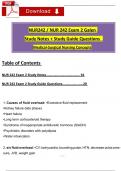NUR242 / NUR 242 Exam 2 Galen
Study Notes + Study Guide Questions
Medical-Surgical Nursing Concepts
Table of Contents
NUR 242 Exam 2 Study Notes………………………………… 01
NUR 242 Exam 2 Study Guide Questions……………………20
1. Causes of fluid overload: •Excessive fluid replacement
•Kidney failure (late phase)
•Heart failure
•Long term corticosteroid therapy
•Syndrome of inappropriate antidiuretic hormone (SIADH)
•Psychiatric disorders with polydipsia
•Water intoxication
2. s/s fluid overload: •CV: tachycardia, bounding pulse, HTN, decrease pulse pres-
sure, JVD, weight gain
,•Resp: increase and shallow resp; SOB, crackles lung sounds
•Skin: pitting edema, skin pale and cool to touch
•Neuromuscular: LOC, HA, visual disturbance, muscle weakness, paresthesia
•GI: increase motility, enlarge liver
3. Assessment for fluid overload: •Assess risk r/t age and diagnosis, history
(overhydration, CHF, kidney disease)
•Assess vital signs why: watch for bounding tachycardia, HTN, dysrhythmias, tachyp-
nea
•Assess lung sounds (crackles) , weight, LOC, Observe JVD
•Assess lab values: electrolytes imbalance and signs and symptoms
• Focus Assessment: skin/extremities/ abdomen and sacrum area for edema
•Assess perfusion: edema may impair perfusion to extremities, assess peripheral
and central pulses, capillary refill, skin color, temp, sensory and motor function
•Observe for urine output
4. Lab values fluid overload: •Serum osmolality (275-295 mOsm/kg)
•Decrease found in overhydration <275; and < 265 is critical finding
•CBC
•Decrease hemoglobin and hematocrit
•BUN
•decreased BUN
•Electrolytes
•Decreased sodium (shifts due to dilution)
•Urine specific gravity Decrease < 1.005
, 5. fluid overload interventions/goal: •Goal: reduce excess body fluids, promote
desired elimination
•Manage underlying cause
•Restrict dietary sodium intake
•Monitor I/O
•Administer diuretic
•Monitor client's s/s and electrolytes values
•Restrict oral and other fluid intake as prescribed
6. Fluid overload complications: •Isotonic overhydration
•HF and pulmonary edema
•Seizure
•Coma
7. Fluid overload medications: Furosemide
Mannitol
8. S/S of dehydration: •Vital signs: hyperthermia, ST, thread pulse, hypotension,
decrease CVP
•Neuromusculoskeletal: Dizziness, syncope, confusion, weakness, fatigue
•GI: thirst, dry furrowed tongue, N/V, anorexia, weight loss
•Renal: Oliguria
•Other signs: Diminish capillary refill, cool clammy skin, diaphoresis, sunken eye-
balls, flat neck vein




